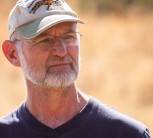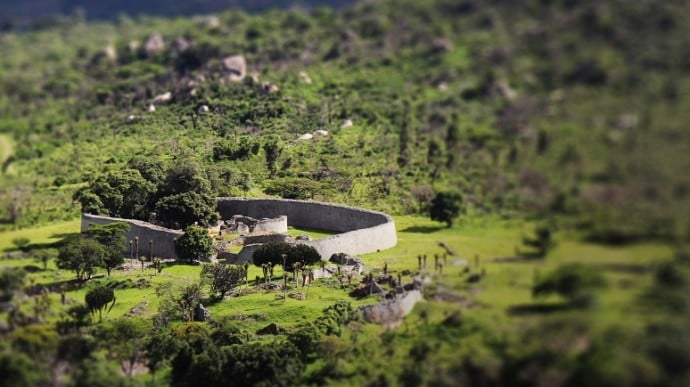Dr Ned Snelling, Senior Lecturer in the Department of Anatomy and Physiology and Prof Leith Meyer, Director of the Centre for Veterinary Wildlife Studies, both from the Faculty of Veterinary Science have just published a new study on the welfare and survival of Africa’s arid-dwelling mammals under the threat of climate change.
The pair teamed up with their Brain Function Research Group (BFRG) collaborators at Wits University to show how mammals will need to contend not only with increasing heat loads into the future, but also reduced water and food availability, a situation that will compromise their ability to regulate body temperature. The authors explain how a lack of water will suppress evaporative cooling during the day, while a lack of food will limit metabolic heat production at night, leading to body temperature irregularities, physiological malfunction and possible death.
The publication has appeared in a special themed issue - "Predicting the Future: Species Survival in a Changing World" - of the Journal of Experimental Biology with a once-off free access. To access and view the study/abstract please click here.
Dr Ned Snelling, Prof Leith Meyer
February 24, 2021

Professor Edward Snelling did his undergraduate studies at the University of Adelaide, Australia and joined the University of Pretoria’s Faculty of Veterinary Science in February 2019.
His research is at the interface of experimental physiology, biomechanics and biochemistry. He uses models from Africa and Australia to study resting and locomotor energetics, respiratory and cardiovascular performance, muscle and skeletal systems, and thermoregulation in mammals, birds, fish, and insects. More information here -> www.edwardsnelling.com

Professor Leith Meyer has been doing research at the University of Pretoria (UP) for 12 years. He completed his undergraduate studies at UP’s Faculty of Veterinary Science in 2000, and joined the University of the Witwatersrand in 2003 as a lecturer in physiology. After two years, he was appointed as a research officer in Wits University’s Brain Function Research Group at the School of Physiology. During that time, Prof Meyer became particularly involved in the group’s research on wildlife environmental physiology and the consequences of game capture. In 2010, he obtained a PhD from Wits that focused on the reduction of the side-effects of capture.
Through his research, Prof Meyer aims to improve the welfare and conservation of various wildlife species. Within his academic discipline, he leads research that seeks a better understanding of the physiological consequences of veterinary management procedures, particularly when animals are captured, translocated, reintroduced into a habitat, rehabilitated or anaesthetised.
“Wildlife vets and managers play a key role in conservation programmes; my work helps these professionals to improve the health and welfare of wildlife species when they work with them,” Prof Meyer says. “My primary research interest and focus is to find novel ways of reducing the side-effects of wildlife capture, anaesthesia and translocation to improve animal health and welfare. We are working on several studies involving a number of different wildlife species, with a focus on rhinos.”
A recent highlight of his research was the discovery that one of the key drugs used to dart wildlife, especially rhinos, causes the activation of the animal’s stress pathways. This activation negatively affects these animals by making them hypermetabolic and hinders oxygen from entering their bodies through the lungs.
“We recently started a study to test novel drugs that can block these effects, with initial promising findings,” Prof Meyer explains. “We’re hoping to discover ideal drug combinations that can best prevent these adverse effects and make capture and anaesthesia safer for wildlife.”
He hopes that his work will have a positive impact on conservation, and improve the way in which wildlife vets handle and look after wild animals in the face of rapidly declining biodiversity. The changes in the world are making the conservation of nature challenging, with human interventions becoming more and more important, he adds.
Prof Meyer’s advice to school learners or undergraduates who are interested in his field is to stick to their dreams if they are passionate about becoming a wildlife vet and making a difference.
“It is an exciting and important field to be involved in, but hard work, dedication and commitment are required.”
 Story
Story
This edition is curated around the concept of One Health, in which the University of Pretoria plays a leading role globally, and is based on our research expertise in the various disciplines across healthcare for people, the environment and animals.
 Story
Story
Highly sophisticated water management techniques of ancient civilisations demonstrate the ingenuity of inhabitants who lived with limited water. It appears we need to look to the past to ensure a stable water supply in the future.
 Story
Story
A new study by researchers at the University of Pretoria (UP) and the University of Adelaide in Australia has revealed the real function of the giraffe’s long legs ¬– to reduce blood pressure.
Copyright © University of Pretoria 2025. All rights reserved.
Get Social With Us
Download the UP Mobile App